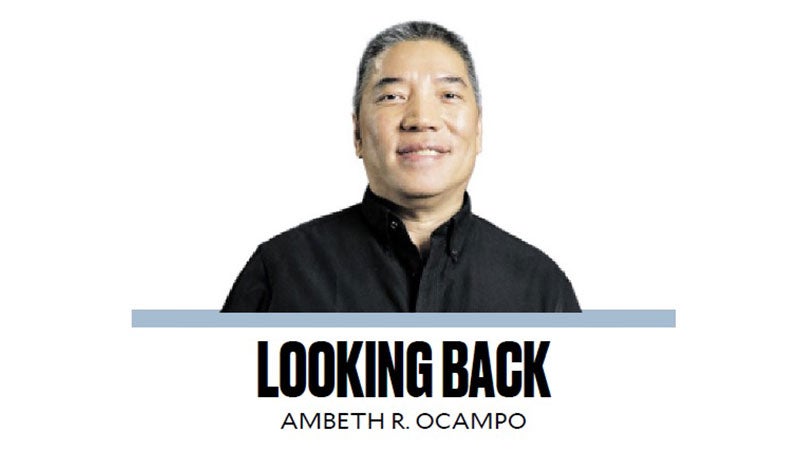Letters from exile

Time waits for no one. If time does not stop, can we really save time, or waste it? The pandemic lockdown made me value time, flowing like a stream of water through my fingers, reminding me of Apolinario Mabini, who was exiled to Guam from January 1901 to February 1903. Books kept us company in isolation, but I was luckier because electricity, smartphones, and a stable internet connection allowed for many distractions. When the spring in Mabini’s Roskopf watch broke in June 1902, he wrote home, requesting his brother to find a replacement. “Having a watch,” he said, “I feel that the hours pass and if the fleetness of time saddens the happy, on the contrary, it consoles those who suffer, reminding them that sufferings also pass, as all the joys and greatness of the world pass.”
Mabini was given special treatment by the American captors because he could communicate in English, and, being a person with a disability, he was not a flight risk. He was allowed books, one of them being a historical novel set in the “Hundred Years War” by Arthur Conan Doyle. Would Mabini have preferred the adventures of Sherlock Holmes by the same author? He was allowed pen and paper, so he wrote a lot: letters, memoranda, petitions, and a memoir that has come down to us as “La Revolucion Filipina.” Asked if Filipinos had culture and literature, he provided proof by writing out from memory the entire “Florante at Laura.” Mabini’s memory was sharp from constant use; if he had Google, he would not have committed to memory as much as he did.
When Mabini arrived in Guam with other deportees from Manila, their prison had not yet been built. With no buildings or huts to house them temporarily, they were kept aboard the steamer for about 19 days before being allowed to disembark in a place called Piti and made to travel on foot or in carts to Agaña, the former capital of the Spanish Marianas Islands, now known as Hagatna, capital of the US territory of Guam. They were housed in tents on a lot previously occupied by a leper hospital during the Spanish domination, prompting Mabini to quip, “The place could not be better suited, since our minds are suffering from contagious illness … like the leper we are forcibly separated from our fellow human beings.” Back home, American military officials used the language and method of quarantine to subdue both the cholera epidemic and the Philippine-American War. They burned fields and leveled barrios, forcing inhabitants into hamlets where they were met by isolation, starvation, and disease.
Mabini made the best of a bad situation and tried to see the silver lining. He described his surroundings: the fine sand at his feet, the raging sea to his north, with a hill to his back and side. He wished for more foliage, wished that the coconut trees grew closer to each other so that the sun would not shine too harshly on their tents. Two months after their arrival, Mabini presided over elections with votes cast by 48 exiles. Results for president were as follows: Pio del Pilar, 20 votes; Artemio Ricarte, 9; Pablo Ocampo, 8; Mabini, 2; and Julian Gerona, 1. For vice president: Pio del Pilar, 12; Julian Gerona, 12; Pablo Ocampo, 7; Simon Tecson, 4; Ricarte, 3; Lucino Almeida, 1; and Mr. Requestas, 1. Mabini proclaimed Del Pilar president and Gerona vice president. Del Pilar declared himself unfit for the office because he spoke neither Spanish nor English. Mabini assured him that his election was based on other qualities aside from his language skills.
From Mabini’s letters, one can get a sense of their imprisonment. Even if they were not kept, literally, behind bars, they were confined to camp, their correspondence read and censored. Mabini was allowed to bring in his elder brother, Prudencio, to tend to his needs. Other deportees brought in relatives and servants, too. An issue arose when relatives and servants only wanted to serve their principals and not do the common chores, like cleaning to make the camp livable for all. For that, Mabini had to step in.
On Nov. 30, 1901, Mabini sent a written complaint in English to the commanding officer, stating that their cook refused to take canned meat from the commissary because nobody wanted to eat it. Everyone in the camp was tired and sick from having a canned meat diet for 11 months. In March 1902, Mabini followed up on this complaint and requested that some prisoners or the companions of the prisoners be allowed to leave the presidio or camp and go into town to procure fresh food:
“The undersigned crave from you this favor with no other purpose, apart from the expansion of soul and for a change in their food. The necessity, which has compelled them to take, contrary to their customs, canned foodstuffs during more than one year, has spoiled their stomachs so that now after every meal, instead of feeling themselves satisfied in their necessity, they feel nauseated and acquired a propensity to vomit.”
Apolinario Mabini, the Sublime Paralytic or ”Dakilang Lumpo,” wrote a lot for a nation that does not read him. A pity, because our generation has a lot to learn from his practical wisdom.
Ambeth is a Public Historian whose research covers 19th century Philippines: its art, culture, and the people who figure in the birth of the nation. Professor and former Chair, Department of History, Ateneo de Manila University, he writes a widely-read editorial page column for the Philippine Daily Inquirer, and has published over 30 books—the most recent being: Martial Law: Looking Back 15 (Anvil, 2021) and Yaman: History and Heritage in Philippine Money (Bangko Sentral ng Pilipinas, 2021).


















Gaza evacuation: For humanitarian reasons only